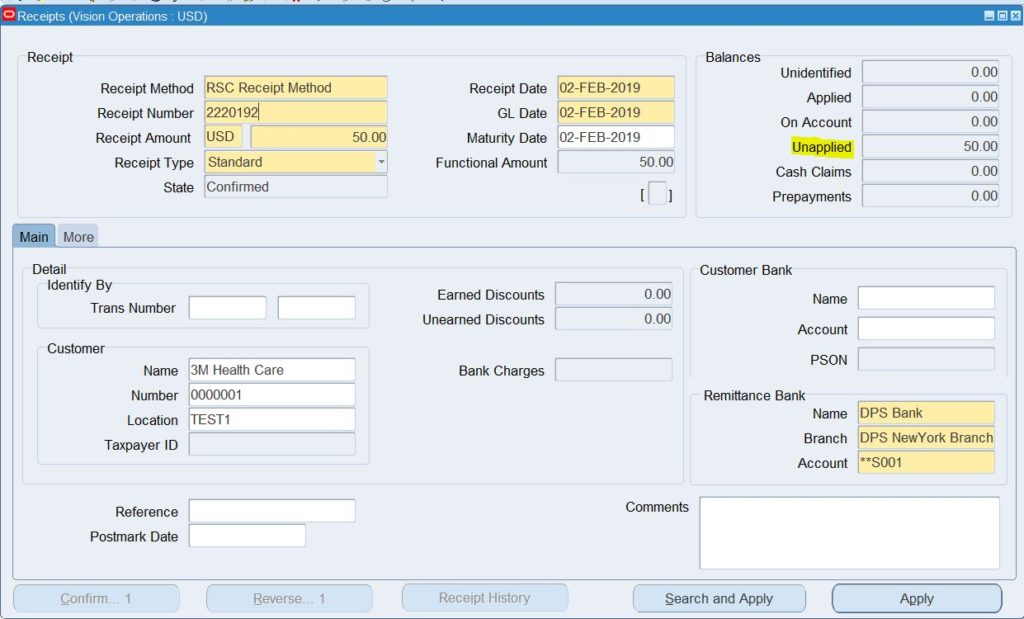The following post will detail the steps that are done to create a Receipt Write-Off on an AR Receipt. The PL/SQL API Ar_receipt_api_pub.activity_application is used to apply an adjustment on a Receipt – in this case – a Write-Off on a Receipt.
In this post – before doing a Write-Off on a Receipt – let us create a sample Receipt first. In order to create a Receipt – Navigate to the following: Receivables Superuser -> Receipts -> Receipts. Enter the following mandatory fields like – Receipt Method, Receipt Number, Receipt Amount, Customer details and click Save. Upon creating a Receipt – it shows up as below:

-- Script to create a Receipt Write-off
DECLARE
CURSOR c_receipt_data
IS
SELECT cash_receipt_id, receipt_number, amount, org_id
FROM ar_Cash_receipts_all
WHERE receipt_number = '2220192' -- Enter your receipt number here
AND status = 'UNAPP';
l_applied_payment_schedule_id NUMBER;
l_receivables_trx_id NUMBER;
x_return_status VARCHAR2 (200);
x_msg_count NUMBER;
x_msg_data VARCHAR2 (200);
p_link_to_customer_trx_id ra_customer_trx.customer_trx_id%TYPE;
p_apply_date ar_receivable_applications.apply_date%TYPE;
p_apply_gl_date ar_receivable_applications.gl_date%TYPE;
p_ussgl_transaction_code ar_receivable_applications.ussgl_transaction_code%TYPE;
p_attribute_rec AR_RECEIPT_API_PUB.attribute_rec_type;
p_global_attribute_rec AR_RECEIPT_API_PUB.global_attribute_rec_type;
p_comments ar_receivable_applications.comments%TYPE;
p_application_ref_type ar_receivable_applications.application_ref_type%TYPE;
p_application_ref_id ar_receivable_applications.application_ref_id%TYPE;
p_application_ref_num ar_receivable_applications.application_ref_num%TYPE;
p_secondary_application_ref_id ar_receivable_applications.secondary_application_ref_id%TYPE;
p_payment_set_id ar_receivable_applications.payment_set_id%TYPE;
p_receivable_application_id ar_receivable_applications.receivable_application_id%TYPE;
p_customer_reference ar_receivable_applications.customer_reference%TYPE;
p_val_writeoff_limits_flag VARCHAR2 (200);
p_called_from VARCHAR2 (200);
p_netted_receipt_flag VARCHAR2 (200);
p_netted_cash_receipt_id ar_cash_receipts.cash_receipt_id%TYPE;
p_secondary_app_ref_type ar_receivable_applications.secondary_application_ref_type%TYPE;
p_secondary_app_ref_num ar_receivable_applications.secondary_application_ref_num%TYPE;
BEGIN
l_applied_payment_schedule_id := -3;
SELECT RECEIVABLES_TRX_ID
INTO l_receivables_trx_id
FROM ar_receivables_trx_all
WHERE name = 'Receipt Write Off';
FOR rec_recpt_data IN c_receipt_data
LOOP
mo_global.init ('AR');
mo_global.set_policy_context ('S', rec_recpt_data.org_id);
AR_RECEIPT_API_PUB.Activity_application (
p_api_version => 1.0,
p_init_msg_list => FND_API.G_TRUE,
p_commit => FND_API.G_TRUE,
p_validation_level => FND_API.G_VALID_LEVEL_FULL,
x_return_status => x_return_status,
x_msg_count => x_msg_count,
x_msg_data => x_msg_data,
p_cash_receipt_id => rec_recpt_data.cash_receipt_id,
p_receipt_number => rec_recpt_data.receipt_number,
p_amount_applied => rec_recpt_data.amount,
p_applied_payment_schedule_id => l_applied_payment_schedule_id,
p_link_to_customer_trx_id => p_link_to_customer_trx_id,
p_receivables_trx_id => l_receivables_trx_id,
p_apply_date => p_apply_date,
p_apply_gl_date => p_apply_gl_date,
p_ussgl_transaction_code => p_ussgl_transaction_code,
p_attribute_rec => p_attribute_rec,
p_global_attribute_rec => p_global_attribute_rec,
p_comments => p_comments,
p_application_ref_type => p_application_ref_type,
p_application_ref_id => p_application_ref_id,
p_application_ref_num => p_application_ref_num,
p_secondary_application_ref_id => p_secondary_application_ref_id,
p_payment_set_id => p_payment_set_id,
p_receivable_application_id => p_receivable_application_id,
p_customer_reference => p_customer_reference,
p_val_writeoff_limits_flag => p_val_writeoff_limits_flag,
p_called_from => p_called_from,
p_netted_receipt_flag => p_netted_receipt_flag,
p_netted_cash_receipt_id => p_netted_cash_receipt_id,
p_secondary_app_ref_type => p_secondary_app_ref_type,
p_secondary_app_ref_num => p_secondary_app_ref_num);
dbms_output.put_line ('Return status from API is: '||x_return_status);
dbms_output.put_line ('Return= '||SUBSTR(x_msg_data,500));
dbms_output.put_line ('Receivable Application ID is: '||p_receivable_application_id);
END LOOP;
COMMIT;
EXCEPTION
WHEN OTHERS
THEN
DBMS_OUTPUT.put_line ('Error: ' || SQLERRM);
END;And thus, happy Adjusting Write-offs.